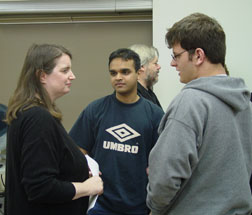 Medievalist Martha Bayless chats with students following a lecture on Tolkien's The Lord of the Rings trilogy |
Professional science fiction and fantasy writer Dave Bischoff and Martha Bayless, professor of medieval literature at the University of Oregon, compared the latest cinematic effort to bring Tolkien’s classic to the big screen in a talk at Wabash College Thursday evening.
The timely lecture comes at a point where New Line Cinema’s The Two Towers already has grossed more than $309 million with viewers eagerly waiting for the final installment of the trilogy.
Bischoff, who has experienced the compromise that goes into translating written ideas to film and television, spoke of the difficulties that director Peter Jackson must have faced when preparing to make the movies.
“When I hear Peter Jackson talk, I hear someone who has obviously read the books over and over again,” says Bischoff. “However, writers and directors face compromise when their work is brought to film. Tolkien took no shortcuts. If Tolkien sat in the movie theater watching The Two Towers, probably with his hands over his eyes while wearing earplugs, he would be appalled.”
Bischoff reminded the group that the basis of The Lord of the Rings was the uniqueness of the languages that were created by the author.
“The languages added depth. It’s what distinguishes The Lord of the Rings from other works.”
Bayless, who was taught by some of Professor Tolkien’s students, looks at the movies and the writings of Tolkien from a medievalist’s perspective.
“The book is not set in the Middle Ages, but it reflects the Middle Ages,” said Bayless.
Bayless reminded everyone that the book was more than just a story of a quest to rid Middle Earth of a source of evil. “The Lord of the Rings constantly shows us a world where things have been lost. The poetry tells the reader of that loss and makes the reader feel that loss. The old, mysterious, dreamy parts are gone, but the tale continues on.”
She also points out that one of Tolkien’s characters, Samwise Gamgee, refers to the ongoing tale in the final book of the trilogy, The Return of the King. Gamgee and Frodo Baggins reflect on their adventures after destroying the Ring.
“Sam speaks to the growing story and adds to it when he says, ‘What a tale we have been in, Mr. Frodo, haven’t we?’ he said. ‘I wish I could hear it told! Do you think they’ll say: Now comes the story of Nine-fingered Frodo and the Ring of Doom? And then everyone will hush, like we did, when in Rivendell they told us the tale of Beren One-hand and the Great Jewel. I wish I could hear it! And I wonder how it will go on after our part.’
“What the story seemingly does is become a legend, says Bayless. “It is translated as it is passed along from generation to generation. Jackson has done the same thing with the movie. This is his telling of the tale.”
Bayless says that the difference between writing for readers and for the screen is that the background can be developed for a book, but the plot has to drive the movie. She added that while the plot in The Two Towers has changed, most of the essentials are still there.